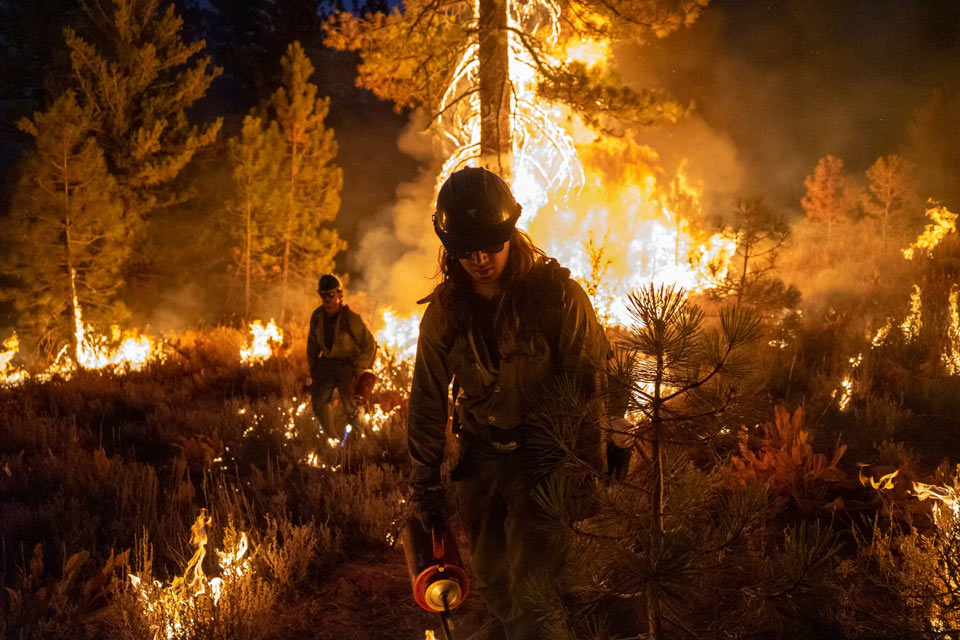
Bureau of Land Management Nevada Ruby Mountain Hotshot Fire Crew lighting back fires on the 2021 Dixie Fire in California
Photo credit: Joe Bradshaw, Bureau of Land Management
Key takeaways
- Human-caused climate change was responsible for a six-to-46-day earlier start to fire season in California between 1992 and 2020, increasing the period in which large swaths of the state were susceptible to destructive burning.
- California’s fire seasons likely will continue to get longer and potentially more destructive as climate warming trends continue.
- Supported by the National Science Foundation and Department of Energy, future studies like this one are threatened by recent funding freezes and cuts.
Global warming has advanced wildfire season from one to almost seven weeks earlier, a new study shows
The start of wildfire season across the state is beginning earlier, and is even more pronounced in California’s higher-elevation mountains and northern forests.
August 9, 2025 - By Jason Islas - The typical start of fire season in California has shifted earlier by an average of more than one day every year in most of the state since the early 1990s, and up to a total change of month and half earlier in some areas, a trend driven by human-caused climate change, according to a UCLA study published in the journal Science Advances.
This trend — even more pronounced in California’s higher-elevation mountains and northern forests, where fire season has expanded by an average of two days every year in the same period — likely will continue as climate change continues to warm the planet, according to the study, which was made possible with support from the National Science Foundation and Department of Energy. In parts of California over the last 30 years, warming has pushed the wildfire season anywhere from a week to almost seven weeks earlier.
“These findings underscore the very real impact climate change has on people’s lives and livelihoods,” said Alex Hall, a co-author of the report and director of both the Sustainable LA Grand Challenge and Institute of the Environment and Sustainability, or IoES.
“The critical importance of climate research cannot be overstated. This year is on track to be the most destructive — and costly — in California history as a result of fire. It is essential that we have the resources we need to do this necessary work, producing rigorous, accurate and societally relevant knowledge that can help policymakers make informed choices as they plan for a changing future,” Hall said.
The study found that fuel aridity — the dryness of typical fire fuels like grasses and trees — had the strongest influence on year-to-year shifts in the timing of the onset of fire season, and fuel aridity is largely affected by climate conditions.
California has been seeing more large wildfires
While the annual number of large wildfires (those over 10,000 acres) varies year to year with the dryness of the state, the trend has been rising.
“Year to year, there will always be some natural fluctuations,” said Gavin Madakumbura, lead author of the study and a postdoctoral researcher at UCLA. “Some years are wet, others dry. Some years are hotter than others. In our study, we separated the natural climate variations from changes driven by human-caused climate warming.”
“Our results suggest that as climate warming trends continue, this pattern will likely persist, with earlier starts to fire seasons in the coming years. This means longer fire seasons, increasing the potential for more of the state to burn.”
The impact of this trend is most acute in California’s northern mountains, where snowpacks have historically kept the ground and vegetation wetter for longer stretches, but in warmer years, when the snowpack melts earlier, the fire potential rises earlier too.
In addition to Hall and Madakumbura, contributors to this report include Max A. Moritz, a wildfire specialist with U.C. Cooperative Extension, part of the U.C. Agriculture and Natural Resources Division; and UCLA’s Karen McKinnon, Park Williams, Stefan Rahimi, Benjamin Bass, Jesse Norris and Rong Fu.
Source: UCLA




